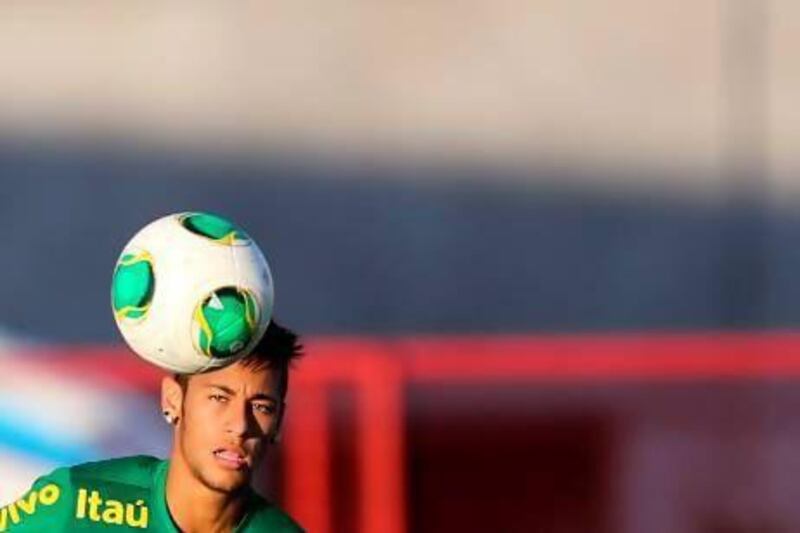BRASILIA // It was the goal that made all of Brazil cry.
July 16, 1950. Brazil, hosting their first World Cup and having swaggered to the final with all the confidence and charisma that would later come to define them, faced Uruguay. Success was certain. That was until the 79th minute when, in front of what is believed to be the largest football attendance in history, their opponents took the lead.
It remains Brazil's most famous defeat; arguably their most famous match. For a country that has since gone on to win the World Cup five times, more than any other in world football, it provides a perfect example of the complicated equation involving intense pressure, heightened expectations and unbearable heartbreak.
Today, Brazil begin their journey to purification as they face Japan in the opening match of the Confederations Cup, a tournament as much about testing the host nation's logistical set-up for next year's summer showcase as it is about crowning intercontinental champions.
Critical evaluations will take place on both fronts, but infrastructure issues will be temporarily forgotten so long as the host nation emerge triumphant on June 30. In previous years that might not have been seen as such a tough task - Brazil have won the past two editions of this event, in 2005 and 2009, but this year success would be especially significant.
Brazilian fans are, for once, playing down their chances. The team are 22nd in Fifa's world rankings - an all-time low - and are officially only the fifth-best team in South America. The appointment of Luiz Felipe Scolari late last year was seen by many as a final roll of the dice; the sporting equivalent of calling in a retired safecracker for one last job.
Scolari, who led the Selecao to World Cup glory in 2002, has endured an unremarkable start to his tenure after replacing Mano Menezes. Seven matches, two wins, four draws, one defeat. Brazil, having qualified as hosts, have not played a competitive match since the Olympics last summer. As a result, for this month's tournament, "Felipao" has selected a startlingly young and inexperienced squad in a bid to test potential recruits in a pressure-cooker atmosphere.
The only players from Brazil's 2010 World Cup squad are Julio Cesar, Thiago Silva and Dani Alves.
"The majority of the players we picked haven't played an official competition with Brazil," Scolari said recently. "Before they can play in a tournament like the World Cup, I need to observe them playing in bigger matches. We lose by not having more veterans in the squad, but we gain by having their youth and desire to succeed."
That means no place in the squad for older, nerve-settling players such as Kaka or Ronaldinho, the latter of whom has enjoyed a fruitful past 12 months playing in the Brazilian Serie A. Instead, Scolari has called up the likes of Bernard, Ronaldinho's a diminutive, 20-year-old teammate at Atletico Mineiro, and Fernando, the midfielder who this week joined Shakhtar Donetsk from Gremio for €11 million (Dh53.9m).
Regardless of the team selected this afternoon, the brunt of the focus will fall on the wily shoulders of Brazil's wonderfully gifted striker, Neymar. Still only 21, he was controversially left out of the 2010 squad by the former coach Dunga, but he is now the poster boy of the new Brazil. Such is his stature in his homeland that his face is inescapable, promoting everything from property to cars to phone companies. If he performs, so do Brazil.
The problem is, however, that for the past 842 minutes, the soon-to-be Barcelona striker has failed to find the net. In Brazil's timely 3-0 friendly win against France earlier this week, the former Santos striker looked subdued, eventually replaced by Bernard. When prodded for his thoughts ahead of today's game, Neymar appeared tetchy.
"I can't behave for the national team as if I was with Santos, where everyone knew me. Here, they still need to get to know me," he said. "We're still looking for our best team and I'll be competing in one of the most important competitions of my career. I'll improve myself at each training session, every day."
If Neymar fails to perform, it is unlikely to take long for Brazil's fans to turn against their team. During the France match when Scolari brought on Lucas Moura for Oscar rather than the ineffective striker Hulk, chants of "donkey" came from the stands, aimed at the Selecao coach.
"The Brazil fans can be quite demanding, but they will respond to what we give them," Scolari said.
This month, starting against Japan this afternoon, he is hoping to give them an early indication that the ghost of 1950 is ready to be exorcised. For the millions of expectant supporters, the alternative is almost unbearable to consider.





